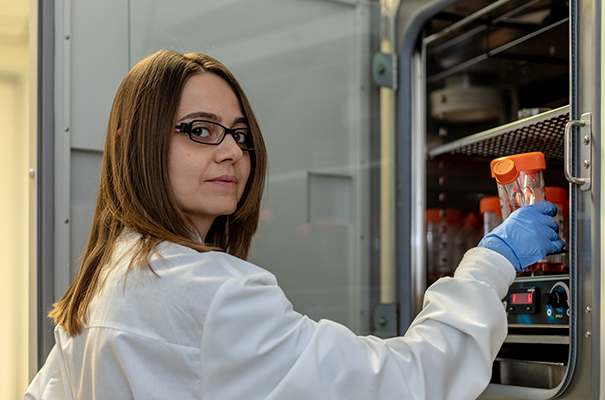
Giorgia Quadrato loves a good challenge. That’s why USC’s newest assistant professor of stem cell biology and regenerative medicine currently spends her time growing 3D networks of human nerve cells, called brain organoids, in the laboratory.
“I think studying the brain is, by definition, probably one of the most challenging fields of study,” she said. “And so I have been drawn to neurobiology.”
Quadrato’s first love wasn’t science, but Greek philosophy. She grew up in Bari, Italy, on the coast of the Adriatic Sea, reading the Greek and Latin classics. At first it seemed that this would be her career path, but she was drawn to the challenge of science. So she moved to Milan, where she earned her bachelor’s and master’s degrees in biotechnology from the University of Milano-Bicocca.
“There was this dogma that the number of neurons you are born with will be the same throughout your life,” said Quadrato. “And then when I just started the university, it was demonstrated that throughout adulthood the human brain generates new neurons from a pool of stem cells. I became passionate about this, because I always liked when, in science, someone tried to break a dogma.”
While earning her PhD in pharmacological biotechnology at the University of Novara, she focused on molecules that can stimulate the birth of new neurons in the region of the adult brain responsible for learning and memory. She continued studying how adult stem cells give rise to new neurons during her postdoctoral training in Simone Di Giovanni’s lab at the Hertie Institute for Clinical Brain Research at the University of Tübingen, Germany.
As she became more interested in the role of neural stem cells in human specific neuropsychiatric disorders, she moved to Paola Arlotta’s lab at Harvard University.
“I’m very interested in neuropsychiatric disorders,” she said. “We basically know very little about what causes them. What makes it even harder is that we cannot really access living human brain, and this makes it difficult to design effective therapeutics.”
In the Arlotta Lab, Quadrato used human stem cells to grow brain organoids, over a period of nine months—far longer than had ever been done before.
The organoids formed networks of different cell types, including retinal cells. This made sense to Quadrato, since during embryonic development, the brain and the retina form from the same progenitor cells. These retinal cells enabled the brain organoids to respond to light by changing their neuronal activity.
“It’s like having an emerging sensory system already there that you can modulate to study network behavior,” said Quadrato. “This is important if you are interested in modeling neuropsychiatric disorders, because you have a physiological way to change the pattern of neural activity.”
Quadrato published her progress in Nature in 2017, and started her own lab at USC the following year.
As an assistant professor, she will work to cultivate organoids that contain cells from different regions of the brain, ranging from the cerebral cortex to the cerebellum. She will also try to ensure that the organoids’ cellular composition is consistent and predictable—which is not currently the case. In addition, she’s studying a specific autism-related gene mutation that causes humans to develop macrocephaly, and brain organoids to grow to four times their normal size.
Quadrato will also study patient-derived neural cells transplanted into mice.
At the same time that Quadrato has launched her own laboratory, she has also started her family. She and her husband recently welcomed, Matilda, their first child.
“I’ve appreciated the opportunity, especially in my last experience with Paola Arlotta, to work with very strong women that also have juggled family and career,” said Quadrato. “I really learned a lot from this, and I’m very grateful. So for me, it will be a really important aspect of my work: mentoring women in science.”
Her lab has already grown to six members, and she’s excited to discover what lies ahead.
“I decided to join this department because it has a culture that drives innovation,” she said. “This is due to the fact that there are so many junior faculty. And so there is this culture of embracing creativity, because junior faculty are fresh, and are not bound by dogma. I really like also that this innovative and collaborative culture extends to the broader USC community, which supports and encourages multidisciplinary collaborations.”
